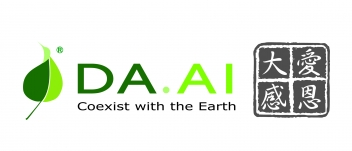

DA.AI Technology

Taipei, Taiwan
May 2016
Textiles
Wholesale/Retail
Taiwan
DA.AI was founded in December 2008. They are dedicated to producing eco-friendly products and donate 100% of their net proceeds to charity. DA.AI adheres to Dharma Master Cheng Yen’s concept of “Coexist with the Earth” by using recycled PET bottles as raw material to manufacture recycled eco-products, activating a new life cycle for the PET bottles and reducing the consumption of natural resources. 100% of DA.AI’s net proceeds from the sale of eco-friendly products and its investments are donated to the Tzu Chi Foundation to help the underprivileged. DA.AI has developed recycled textile raw materials, such as recycled poly chips, recycled polyester fibers and recycled fabrics. These recycled raw materials are then used to produce eco-products such as clothing, beddings, and other everyday textile products. DA.AI’s production process has received a “Global Recycling Standard” (“GRS”) certification from the Netherland’s Peterson Control Union. In order to gain GRS process certification, all stages of production, from obtaining raw materials to manufacturing and trading of the products have to be in compliance with the GRS standard.
Overall B Impact Score
Governance 8.5
Governance evaluates a company's overall mission, engagement around its social/environmental impact, ethics, and transparency. This section also evaluates the ability of a company to protect their mission and formally consider stakeholders in decision making through their corporate structure (e.g. benefit corporation) or corporate governing documents.
What is this? A company with an Impact Business Model is intentionally designed to create a specific positive outcome for one of its stakeholders - such as workers, community, environment, or customers.
Workers 14.6
Workers evaluates a company’s contributions to its employees’ financial security, health & safety, wellness, career development, and engagement & satisfaction. In addition, this section recognizes business models designed to benefit workers, such as companies that are at least 40% owned by non-executive employees and those that have workforce development programs to support individuals with barriers to employment.
Community 36.2
Community evaluates a company’s engagement with and impact on the communities in which it operates, hires from, and sources from. Topics include diversity, equity & inclusion, economic impact, civic engagement, charitable giving, and supply chain management. In addition, this section recognizes business models that are designed to address specific community-oriented problems, such as poverty alleviation through fair trade sourcing or distribution via microenterprises, producer cooperative models, locally focused economic development, and formal charitable giving commitments.
What is this? A company with an Impact Business Model is intentionally designed to create a specific positive outcome for one of its stakeholders - such as workers, community, environment, or customers.
Environment 20.1
Environment evaluates a company’s overall environmental management practices as well as its impact on the air, climate, water, land, and biodiversity. This includes the direct impact of a company’s operations and, when applicable its supply chain and distribution channels. This section also recognizes companies with environmentally innovative production processes and those that sell products or services that have a positive environmental impact. Some examples might include products and services that create renewable energy, reduce consumption or waste, conserve land or wildlife, provide less toxic alternatives to the market, or educate people about environmental problems.
What is this? A company with an Impact Business Model is intentionally designed to create a specific positive outcome for one of its stakeholders - such as workers, community, environment, or customers.
Customers 2.0
Customers evaluates a company’s stewardship of its customers through the quality of its products and services, ethical marketing, data privacy and security, and feedback channels. In addition, this section recognizes products or services that are designed to address a particular social problem for or through its customers, such as health or educational products, arts & media products, serving underserved customers/clients, and services that improve the social impact of other businesses or organizations.